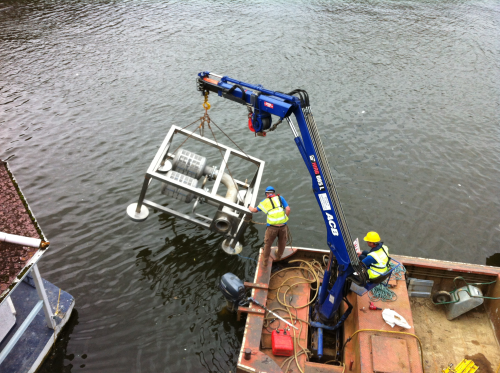
Commercial water filtration consultant engineers Industrial Purification Systems (IPS), is claiming a ‘first’ for the construction industry by designing energy efficient filtration technology for the state-of-the-art Open Loop Heat Pump system installed at the development ‘Kingston Heights’, Kingston upon Thames, Surrey, UK. The system will deliver under-floor heating and hot water throughout the development and was officially switched on in the Autumn of 2013 by the Rt Hon Edward Davey, Secretary of State for Energy and Climate Change.
Kingston Heights is a £70 million mixed-use development in the Royal Borough of Kingston upon Thames, south-west London owned by NHP Leisure Developments. It consists of 56 affordable homes, 81 private apartments and a 145-bedroom hotel due to open later in the year.
The open loop Mitsubishi based heat pump system is the first installation of its kind anywhere in the UK that harvests naturally stored energy from the River Thames to provide thermal energy for an entire development. As the world faces a possible energy crisis, this has been heralded as being the solution to effectively managing and saving energy resources in the future.
IPS director, Andy Evans, explains: “The open loop system works by using pumps in the plant building to extract water through intakes placed in the River Thames at a level where the water temperature remains constant. After passing this water through heat exchangers connected to heat pumps to extract the energy from the water, the water is then returned to the river with the minimum of heat gain. This minimizes the impact on overall river temperatures and water dissolved oxygen levels.
“This process is traditionally done utilising bore holes similar to projects we have carried out for the Royal Festival Hall and the Tate further down river. However abstracting from a river source is the ‘new concept’ in establishing levels of thermal energy efficiency for large scale developments which significantly produces zero on-site carbon emissions.
“In contrast to bore hole extraction, river water is a much more difficult process as the solids levels are much higher and also uncontrolled. The filtration plant therefore has to be considerably more robust and presents much more of a technical challenge.
“The particular filtration system we have developed at Kingston Heights comprises two-off in-river automatically backwashing filters which had to meet the exacting demands of the Environment Agency. These are designed to run at optimum efficiency by only backwashing when conditions demand rather than continuously, as is typical of in river filtration.
“The water, when first extracted, is filtered to 1,500 micron and at an exceptionally low filtration velocity even when partially blocked and requiring cleaning. This ensures that elvers and fish fry are protected from being sucked into the water abstraction system.
“The water is then passed through secondary filters. These are designed to protect the heat exchangers connected to the heat pumps and are oversized for the application to ensure effective operation even under flood conditions. Future proofing of the filter design means that they can be upgraded to protect the system from Zebra mussel seed. These filters incorporate the latest precision driven cleaning heads for effective filter cleaning at low micron grades. This is paramount when dealing with a combination of heavy solids loading and very fine filtration
“To ensure cost efficiency in terms of maintenance and long operational life the filters are constructed from 316 stainless steel. In addition, intermittent cleaning means longer service operation before they need to be removed from the filter bed for routine maintenance.
“The filter systems are fully integrated within the building management system so their operational condition can be monitored at all times.”
IPS worked closely with the Environment Agency and Fisheries Department to ensure that the in-river automatic filtration was optimised to protect the susceptible junior fish and young migrating eels. It was also important that the filters enabled the return of clean water back into the River Thames that varied by no more that 3° from the abstracted water.
Chris White, managing director of White Associates and the mechanical engineering consultant for the Kingston Heights development, said: “A renewable system such as this has the potential to provide a significant amount of our future energy needs at a fraction of the cost. However, this is a large-scale change in thinking, which will take years, if not generations, to implement. But, from little acorns mighty oaks do grow – and I hope that, through the system installed at Kingston Heights, we have planted the seed in people’s minds that this can be done.”
IPS worked closely with B&V Group, who engineered and built the complete water abstraction system for the development, to guide them through the filtration design process to ensure the best technology was adopted.
Andy Evans said: “There is huge pressure on businesses and communities both here in the UK and internationally to address energy use. We are extremely proud to have played such an important part in being able to demonstrate without a doubt that efficient water filtration technology makes a significant difference to energy use and cost.




